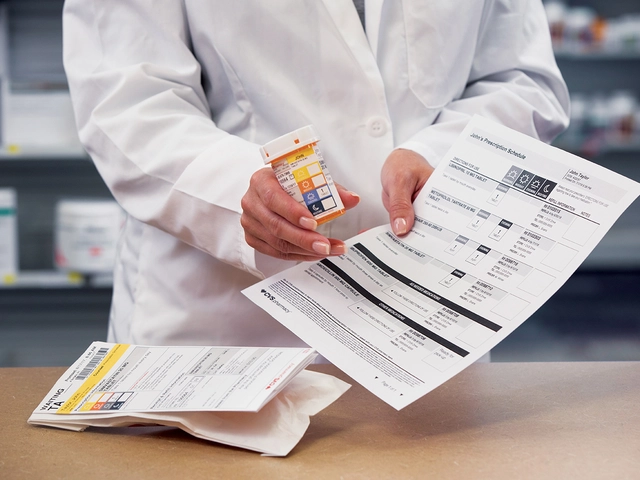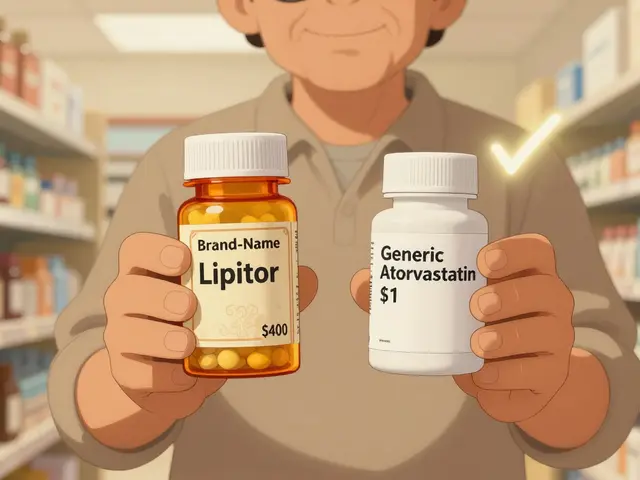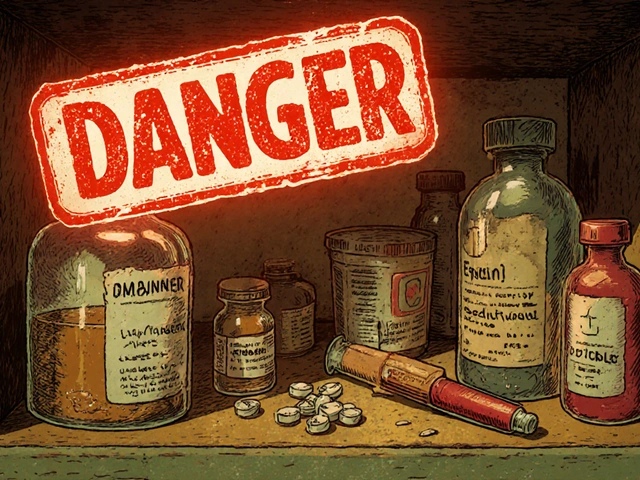Bempedoic Acid vs Atorvastatin: The New Era in Cholesterol Control?
Inside Bempedoic Acid: How It Works to Control Cholesterol
Bempedoic acid isn't just another pill on the shelf—its mechanism does things a bit differently than the statins most people know. Unlike statins, which work directly in your liver and can hit muscle tissue along the way, bempedoic acid is more of a liver whisperer. It’s called a prodrug, which means it’s inactive until your liver enzymes wake it up. Once active, it blocks an enzyme known as ATP citrate lyase. Why’s that a big deal? Because this enzyme sits one step above where statins work in the cholesterol production assembly line (think of it as cutting off the supply before the workers even show up). By stopping ATP citrate lyase, your liver gets the message to pull cholesterol from your blood, rather than cranking out so much of its own.
Here’s a little-known fact: bempedoic acid doesn’t get activated in muscle cells. That hugely reduces the risk of muscle pain and weakness—the main reason people quit statins. So, if you or someone you know has said, "I just can’t handle statins," this is why doctors are buzzing about bempedoic acid. Plus, you don’t have to go to a special clinic or need infusions; it’s a once-a-day pill, as straightforward as your daily multivitamin.
Real-world cholesterol numbers matter most. Studies show bempedoic acid can cut LDL cholesterol by around 18–28% compared to placebo, and that’s on top of what you’re already getting from diet or other meds. Statins are usually more potent (high-dose atorvastatin can drop LDL by 50%+), but bempedoic acid’s advantage is its side effect profile, especially for those who can’t tolerate statins at all. In fact, a decent chunk of people who start statins eventually stop, often complaining about muscle aches or brain fog. That’s where bempedoic acid steps in, filling a gap that’s been ignored for years.
Looking for cardio benefits beyond numbers? Early data hints bempedoic acid doesn’t seem to mess with blood sugar as much as statins can—a relief for folks at risk for diabetes or those already battling it. The list of benefits keeps growing, with mounting evidence suggesting fewer medication interactions and less liver stress.
The bottom line in this section? While bempedoic acid isn't about to bury statins, it’s kicking open doors for people who need another option. Its targeted liver activation makes it reliable, predictable, and just easy on the body in ways folks appreciate when daily life is stressful enough.
Bempedoic Acid In Clinical Trials: What the Numbers Actually Say
You probably want proof—does bempedoic acid really deliver, or is it the next overhyped headline? Let’s grab the receipts. The most headline-grabbing study so far: the CLEAR Outcomes trial. This trial looked at more than 13,000 adults who either couldn’t tolerate statins or were at high cardiovascular risk and already maxed out on statin doses. The results turned heads: over a median of 3.4 years, participants on bempedoic acid saw their LDL drop significantly, and the risk of major heart events (like heart attack or needed procedures) went down by 13% compared to placebo groups. Not earth-shattering, but ask anyone who can’t take statins—this can be life changing.
The CLEAR Harmony and CLEAR Wisdom trials back this up. Both put bempedoic acid up against placebo on top of background therapy, and both found that people shaved off about 17–28% more LDL than if they hadn’t added bempedoic acid. The kicker? Side effects were impressively low. Folks taking bempedoic acid had muscle problems on par with placebo—a huge win for those burned by statin aches.
A quick glance at the safety data: rates of new-onset diabetes, serious liver injury, or rhabdomyolysis didn’t differ much from placebo. There’s a slightly increased chance of higher uric acid (so, gout risk can tick up), but that’s usually manageable for most people who aren’t prone. None of the trials reported scary spikes in blood pressure, kidney injury, or mental cloudiness.
| Trial Name | No. of Patients | Mean LDL Reduction | Cardiac Events Reduced |
|---|---|---|---|
| CLEAR Outcomes | 13,970 | –21% | –13% |
| CLEAR Harmony | 2,230 | –18.1% | No significant change |
| CLEAR Wisdom | 779 | –17.4% | No significant change |
The big story here: while bempedoic acid isn’t magic, it delivers just what it promises. If you’re not keen on the idea of grinding side effects, it’s a game-changer. Most mainstream prescribers are now adding bempedoic acid to their mental short list, especially after stent placement or if statin allergies crop up.

Stacking Up: Bempedoic Acid vs Atorvastatin in Real Life
Now to the head-to-head you really care about: how does bempedoic acid stand next to atorvastatin, the longtime heavyweight? First thing to know—atorvastatin usually drops LDL a lot further. If you go for a high dose, expect at least a 50% drop for most folks. Bempedoic acid doesn’t reach those heights solo: the ceiling’s usually under 30%. But the twist? It shines for the statin-intolerant—the people who try atorvastatin and just can’t stick with it. If you’re happy on atorvastatin, you’re likely already in the sweet spot. But plenty aren’t. In some studies, up to 20% of folks prescribed a statin bail on it within a year due to muscle pain, cramps, or fatigue.
There’s another sneaky benefit. Bempedoic acid pairs really well with ezetimibe (another non-statin LDL cutter). The combo often shaves off even more LDL—sometimes up to 40% from baseline cholesterol. For the truly statin-allergic, this combo almost mimics what you’d get from a medium-potency statin, minus the risk of muscle breakdown.
Practicality matters too. Some patients on atorvastatin need liver function tests and may worry about developing diabetes. Bempedoic acid rarely triggers liver issues and barely nudges blood sugar. There’s also less risk of drug interactions for folks juggling meds for high blood pressure, diabetes, or arthritis. You’ve probably heard older adults grumble about medication “conflicts”—this is where bempedoic acid struts in quietly and does its job without drama.
- Bempedoic acid is often considered for people who can’t tolerate even low-dose statins.
- It can be layered with other cholesterol-lowering drugs—like ezetimibe—for a stronger effect.
- Especially popular with folks seeking a simple, once-daily routine without frequent blood work.
- Not usually the first choice if you need to lower LDL by more than 40% fast (for instance, after a major heart attack).
It’s worth checking out other ways to cut LDL. New injectables like PCSK9 inhibitors are out there, and you can find a useful list covering nearly every alternative to atorvastatin (including PCSK9s, bile acid sequestrants, and more) if you’re looking for something even further off the beaten path.
Cost gets talked about a lot, too. Atorvastatin’s dirt cheap these days—it’s generic everywhere, sometimes less than a cup of coffee a month. Bempedoic acid’s newer, so prices are higher unless your insurance is generous or you score a coupon card. Some folks do a quick cost-benefit: how much does smooth sailing, with no muscle pain, cost you each month? If you’ve tried everything and still can’t find relief, the value of bempedoic acid suddenly clicks.
Practical Tips, Watch-Outs, and Who Should Ask Their Doctor About Bempedoic Acid
Real world, who should be asking about bempedoic acid? Start with folks who’ve had to ditch statins because of muscle pain, aches that just won’t quit, or real trouble with mental sharpness. Also, if your doctor’s worried about interactions between your chronic meds (for things like blood pressure, asthma, diabetes), this option is almost always easier on your system compared to a high-dose statin. Older adults who already take a pharmacy-full of prescription bottles love how simple bempedoic acid makes things—one pill, low fuss.
If you’re under 45 and have off-the-charts LDL thanks to genetics, stacking bempedoic acid and other non-statin drugs might keep you away from serious side effects. Combo therapy (like bempedoic acid plus ezetimibe) is a smart play for people who want results but can’t tolerate higher-dose statins. Your doctor might double-check uric acid once you start, just to guard against gout in at-risk patients. If that’s not your issue, you probably won’t even notice a blip.
Tips for getting the most out of bempedoic acid:
- Take it at the same time each day to keep your body in sync. It’s forgiving, but routine helps you not miss doses.
- Stack it with a good diet—don’t fall into the trap that any pill by itself is a magic bullet. The Mediterranean or DASH diets plus bempedoic acid work wonders together.
- If you’re already on multiple meds, share your full list with your doctor—bempedoic acid’s low interaction risk gives peace of mind but play it safe.
- Ask for regular cholesterol checks. Every three to six months works for most. Celebrate the small milestones!
- If you ever feel weird, extra fatigued, or get sudden joint pain, bring it up. Most side effects are rare and minor, but it's worth a call if something feels off.
Here’s something you might not expect: a few doctors use bempedoic acid as a sort of “statin holiday” buffer. For patients forced off atorvastatin suddenly due to muscle aches, they’ll try bempedoic acid for a few months, settle their levels, then sometimes try to sneak a low-dose statin back in for extra effect. You don’t hear about this trick all that often, but it just shows how flexible this new option can be. Plus, for people with sky-high cholesterol who just can’t get it down, bempedoic acid in a multi-med “cocktail” could make the numbers look almost normal again.
One final watch out: Don’t expect instant results. Big drops in LDL happen over weeks, so keep up your routine and trust the process. Always ask your doctor before swapping out meds—some combinations are brilliant, others not so much. The most important move is knowing what choices you actually have—and with bempedoic acid on the menu, the playbook for cholesterol control just got a lot more interesting.







11 Comments
Pat Mills
July 18, 2025 at 05:09
Honestly, I have to say, this bempedoic acid is getting way more hype than it deserves. Having followed the pharmacological developments closely for years, nothing about it screams a revolution to me. Atorvastatin has been a tried-and-true champion in lipid-lowering therapy, period. The article, though informative, glosses over the long-term effects and comparative safety profiles that have been well-established for statins.
Let me be clear: until bempedoic acid comes with extensive, decades-long data on outcome benefits and side effects, I won't be convinced it's the new era this piece suggests. We have to be cautious and critical about these newfangled alternatives pushed by pharmaceutical marketing.
Does anyone know if there's enough evidence beyond the clinical trial phase to predict real-world efficacy? Also, I'm curious how cost and accessibility stack up compared to atorvastatin, especially for people without premium insurance.
neethu Sreenivas
July 19, 2025 at 05:04
Oh wow, this topic is actually so important for so many people! 😊 I appreciate how the article tries to present the info so clearly, helping those of us who might feel overwhelmed by all the medical jargon.
I do wonder though, since bempedoic acid targets a different enzyme upstream than statins, could it potentially mean fewer side effects? Some people really struggle with muscle pain on statins, right? So maybe this is a hopeful alternative 🫶🏽
That said, I always think we need to listen to our bodies and our doctors, and be cautious but optimistic. Also, I'd love to hear if anyone here has personal experience switching between these meds or combining therapies!
Keli Richards
July 20, 2025 at 04:59
This article provides a solid overview of the differences between bempedoic acid and atorvastatin. I appreciate the clinical trial data being featured, as it gives insight into efficacy without overwhelming the reader.
While atorvastatin remains the standard for many, it's encouraging to have additional options for those intolerant to statins. The mechanism of action for bempedoic acid suggests it could fill some gaps in treatment plans.
Of course, long-term studies will be necessary to fully understand implications for heart disease outcomes, but the preliminary results do look promising.
Ravikumar Padala
July 21, 2025 at 04:54
Reading through this, I'm left wondering whether the fuss over bempedoic acid is justified or just another pharmaceutical marketing push. From what I gather, both drugs lower LDL cholesterol, but atorvastatin has a proven track record.
Honestly, the long sentences in the article made it a bit tiring to follow all the intricate clinical details. I think straightforward, concise info would help most readers better understand the benefits and risks.
Would be good to see real-world patient feedback and maybe a cost comparison too. That plays a big role in what patients and doctors choose.
King Shayne I
July 22, 2025 at 04:49
It's striking how many people hype big pharma without questioning the facts. Bempedoic acid is just another patent-protected drug they want to sell with fancy commercials.
Atorvastatin is generic, cheap, and effective if you look at data critically. Unless there’s solid evidence showing bempedoic acid’s superiority in serious outcomes, it’s hard to see why anyone would fork out more money for it.
Did anyone else notice if side effects or drug interactions were mentioned clearly? That’s crucial info before switching meds.
jennifer jackson
July 23, 2025 at 04:44
I’m feeling hopeful after reading this! New medications like bempedoic acid give us more options, especially for people who can’t tolerate the aches that come from statins.
Lowering cholesterol is so important for heart health, and having alternatives means more people can stick with their treatment plan and improve their outcomes.
It’s great to see research advancing and providing hope to those struggling with side effects.
Brenda Martinez
July 24, 2025 at 04:39
Pat, you’re completely missing the point if you think bempedoic acid is just another overrated fad. People who’ve suffered with debilitating myopathy on statins have been crying out for an alternative, and this drug offers exactly that.
Years of statin-induced muscle pain have ruined countless lives, and to dismiss this new option as mere marketing is irresponsible. You talk about long-term data, but for some, even short-term relief is life-changing.
This article sheds light on a new promising therapeutic avenue that could shift the paradigm, especially for patients abandoned by traditional meds.
Matthew Ulvik
July 25, 2025 at 04:34
Hey all! Not a doctor, but this looks like a solid step forward for cholesterol control. I love that bempedoic acid might mean fewer side effects for some folks 🙂
Of course, everyone’s different, but it’s nice to have options. Anyone here tried switching from atorvastatin to bempedoic acid? Curious about your experience.
Also, combining therapies can sometimes be beneficial, though it’s super important to get medical advice first.
Thanks for sharing this thoughtful piece!
Rocco Abel
July 26, 2025 at 04:29
Honestly, it's amusing how the so-called medical breakthroughs appear and fade regularly, usually worded in a way to maximize hype and obscure minimal benefits. I wouldn't be surprised if behind the scenes, the push for bempedoic acid is heavily influenced by big pharma money, aiming to extend patents and profits rather than actual patient benefit.
Has anyone fact-checked the trial methodologies? Were they double-blind, placebo-controlled, or cherry-picked to favor outcome?
Always approach these new drugs with a heavy dose of skepticism.
Dawn Mich
July 27, 2025 at 04:24
Seriously, the timing of this type of breakthrough always seems suspicious, doesn’t it? Just as statins come off patent, here’s a new drug entering the spotlight. I question the motivations behind these so-called 'alternatives.'
Moreover, the claimed benefits often seem overstated while side effects get brushed under the rug.
Anyone else skeptical about switching meds without much long-term scrutiny? There’s always a gap that leaves patients vulnerable.
Eric Sevigny
July 28, 2025 at 04:19
I find the comparison between bempedoic acid and atorvastatin quite interesting. From a clinical perspective, the mechanism of bempedoic acid as an ACL inhibitor shows promise especially for patients intolerant to statins.
However, as others mentioned, the long-term cardiovascular outcome data is limited, meaning we should be cautious about wholesale adoption before more robust evidence emerges.
In practice, it will likely become an adjunct or alternative in specific patient populations rather than replacing statins altogether anytime soon.
Cost considerations and accessibility will also influence real-world use.